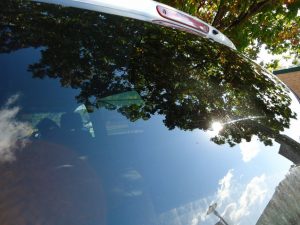Expert’s Tips To Choose The Best Car Window Tint
Car window tint has many benefits than just reducing the heat and protect your car’s interior, reduce glare while driving, providing privacy or improve the look of your car. It acts like a sunscreen for your car’s windows. Professional window tinting is especially beneficial to the people living in the hot climates or the people who park their cars outside regularly.
Are you looking to have your car windows tinted?
With so many tint products available in the market, selecting the best window tint products are sometimes can be hard to distinguish. All the window tint products are not created equal, so here are some important tips to consider while choosing the best window tint for your car needs.
Types Of Car Window Tint
Car window tinting is differentiated into two main categories: metalized film and non-reflective film. The most common non-reflective films are the dyed films that provide increased optical quality and clarity through intense glare control. These films also provide control over both heat and glare through solar absorption.
Metalized films reflect the solar energy; they are more efficient than the dyed films in controlling solar heat absorption. Metalized films keep your car from heat, protect your vehicle’s interior damage and also provide privacy. There are many car window tinting options available with a number of colors, with gray, charcoal, black, gold and bronze being most popular. While in some states, metallic, reflective tinting is not legal, you can use the non-reflective film that provides shade in instances when reflective tinting is not allowed.
In addition to these basic categories, the material used to tint car windows also varies.
There are three main materials used for the window tint: dyed film, carbon film and ceramic film. The most cost-effective option is using the dyed films but has the highest chances of getting the replacement done. The Carbon film is strong and dense and has a moderate discoloration rate, but can create problems with glare and haze. The ceramic film has a high heat rejection, limiting these problems, but it tends to oxidize quickly and can fade.
State Laws
Each state has its specific laws and rules about the color, window tint percentages, reflectivity and other features that may or may not be allowed. So, before choosing a car window film, be certain to check out the laws in your state.
UV Protection
UV rays pass through window glass which may result in fading your car’s interior. It can also damage your skin when you are sitting in your car. Choosing the best UV reflecting window tinting products can protect your skin and your car’s interior from the UV rays of the Sun.
The Right Installer
If you are working with a qualified installer to have your car windows tinted, it’s important to make sure that the job is done right. Though there are DIY kits available for your car window tinting, professional tinting is considered as the most affordable option and it can save you money in the long run. The costs of window tinting depend on the windows you want to tint and the type of tint you’ve chosen. Whatever you decide, you can expect to spend between $100 and $500 for your car window tinting.
If the window tint is not installed correctly, the signs will appear quickly after installation, and the quality of the film also plays a significant role in whether or not the film will last long after its installation. If you’ve installed good quality window films by a professional tint installer, the window tint will last for many years and you will not have to spend repeated tinting costs until the tint begins to fade and needs to be replaced.
Are you looking to have the industry’s leading window tint installed on your car? Check out at tintprosonline.com. You can find multiple dealerships across the country using window tint Woodbridge products to provide you with the ultimate tinting options.

